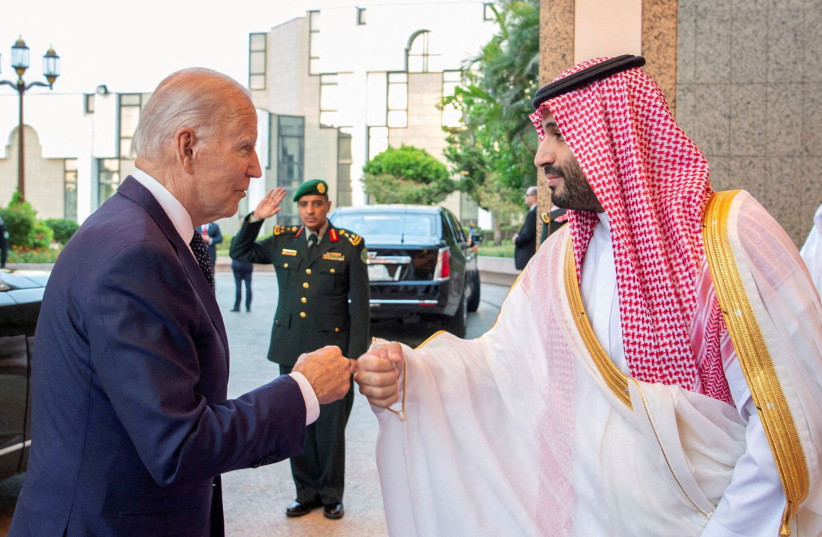An American agreement with Saudi Arabia should include a West Bank settlement freeze and the demolition of outposts, including those that have already been authorized, 20 Senators said in a letter they wrote to US President Joe Biden on Wednesday.
"The agreement should include meaningful, clearly defined, and enforceable provisions to achieve your stated objective of preserving the option of a two-state solution to the Israeli-Palestinian conflict,” the senators said in their letter.
The appeal to Biden was composed by Senators Chris Van Hollen (D-Md.), Chris Murphy (D-Conn.), Peter Welch (D-Vt.), and Majority Whip Dick Durbin (D-Ill.)
They addressed their concerns regarding the complex arrangement which includes a security pact between Washington and Riyadh, an Israeli-Saudi normalization deal, and a possible interim agreement with the Palestinians.

Their opinion carries weight because elements of the deal, which is expected to be considered a formal treaty, would need the approval of 67 out of the 100 UN Senators. At present, according to the Senate website, there are 48 Democrats, 49 Republicans, and three independents.
Any agreement would require bi-partisan support, but Democratic support is particularly essential. Such an agreement is expected to bolster Biden’s re-election campaign so it's presumed that it would be easier to secure the support of Democratic senators and harder to sway Republicans to back the deal.
Among the hurdles facing the deal is the Democratic insistence that it include concessions to the Palestinians that are beyond the scope of what Prime Minister Benjamin Netanyahu’s coalition could be expected to approve.
In their letter to Biden, the Democratic Senators laid out what those demands could be.
There should be “equal measures of dignity and security” for both Israelis and Palestinians, the Senators wrote.
“This should include, among other measures, a commitment by Israel not to annex any or all of the West Bank; to halt settlement construction and expansion; to dismantle illegal outposts (including those that have been retroactively “legalized”); and to allow the natural growth of Palestinian towns, cities, and population centers and the ability to travel without interference between and among contiguous Palestinian areas,” they explained.
“These elements are essential to any sustainable peace in the Middle East and to preserving Israel’s own future as a Jewish, democratic state,” they added.
Concern about Saudi nuclear ambitions
They also shared their concerns regarding the pending US-Saudi security pact and Riyadh’s request for a civilian nuclear power program that would include the ability to enrich uranium.
Traditionally, the Senators said, the defense treaty the Biden administration is envisioning has only been granted to countries who are “the closest of US allies: democracies that share our interests and our values.”
The Senators noted that the “US has long refrained from committing our nation to treaty-backed security guarantees in the volatile Middle East, a region rife with conflict.”
Saudi Arabia, the senators noted, is “an authoritarian regime which regularly undermines US interests in the region, has a deeply concerning human rights record, and has pursued an aggressive and reckless foreign policy agenda.”
For this treaty to gain approval, the senators said, “a high degree of proof would be required to show that a binding defense treaty with Saudi Arabia… aligns with US interests, especially if such a commitment requires the US to deploy substantial new permanent resources to the region.”
The Senators said they were also concerned by the nuclear aspect of the deal.
“We should seriously consider whether it is in US interests to help Saudi Arabia develop a domestic nuclear program” and “we should always maintain the high bar of the gold standard” 123 Agreement which sets out nine nonproliferation criteria and “insist on adherence to the Additional Protocol,” the senators told Biden.
“The provision of more advanced weaponry to Saudi Arabia should be done with careful deliberation to ensure that such equipment only be used for truly defensive purposes and does not contribute to a regional arms race,” they added.
